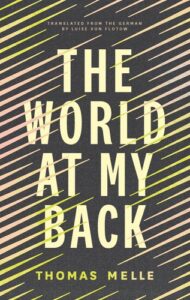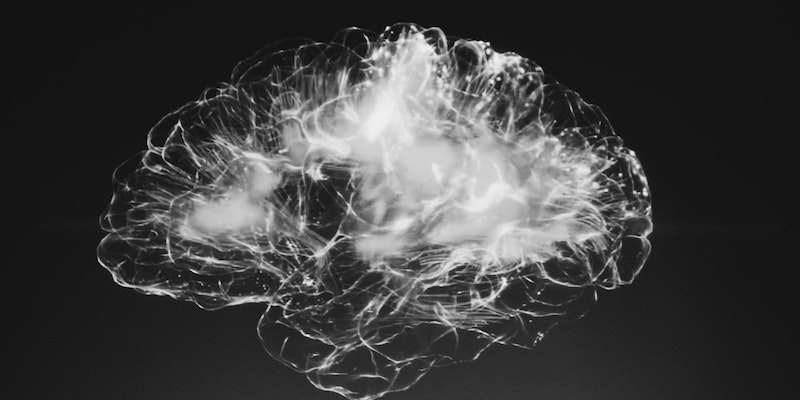“Smoking Ruins Were All Around Me.” On Experiencing Psychosis For the First Time
Thomas Melle Experiences an Internal Earthquake
The drama that a first psychosis unleashes is considerable. It is an unimaginable, all-encompassing blow that flings you into outrageous orbits; for your friends and family it is a total tragedy. Suddenly, out of nowhere, someone they know goes crazy, literally crazy, and in a far more precise, more real, and more embarrassing way than is ever shown in books or films, goes crazy like one of those wild-eyed derelicts who yell at the traffic, and turns stupid, foolish, weird. Out of nowhere a friend becomes a stranger.
Out of nowhere?
Manic-depressive illness is usually assigned five different causes: genetics, changes in neurons, life circumstances, the already described basic condition of vulnerability, and finally, personality. These categories merge and blur. But they offer a sort of direction, a way to understand; even if only one of them fits, and never completely, it still affords a hypothetical template with which to compare the chaos via four or five structural parallels drawn from other cases, and so to extrapolate explanations.
I remember the long-distance phone call my friend Cord made, completely dismayed by my new condition, and how he regained a bit of his composure after the doctor told him it’s all a question of neurons. That was something he could live with; it turned the change in personality into something objective and physical. The reasons were physical; the doctor had shifted them into the realm of bones and nerves, basically like a broken leg, and, as a person, I did not yet have to be given up for lost.
*
The gene for bipolar disorder has not yet been discovered, if it even exists, nor is there any genetically determined pattern, as in Gregor Mendel’s work, that might help you predict who will fall ill and with what degree of likelihood. But both bipolar disorder and schizophrenia have some genetic causes, and the symptoms often overlap and occur in the same family. Even more frequently, those who have bipolar tendencies will find unipolar depression—pure depression, in other words—in their family tree. That is my case.
This earthquake was different: it was taking place inside me.My family is no stranger to psychic frailty. My mother’s father, they say, suffered from phases of depression that were never clinically treated. It was not done at the time and would have run counter to his military discipline. Although, from a child’s perspective, he seemed to swallow a large number of pills every week, there were probably no antidepressants among them. Officially, he had heart and blood pressure problems. He died “upon retirement.” And only offhand remarks were ever made about his dejection and melancholy; they were nodded into non-existence.
My mother has a long, and very clinical history of depression, one of my aunts as well, but milder. So there is something about the genetic material, at least on my mother’s side.
As far as I know, my father’s side has no history of psychological anomalies. As far as I know—since that side has hardly been present.
*
The whole world was gone. Everything was being dragged away. No earthquake could have done more damage. It’s just that this earthquake was different: it was taking place inside me, and the destruction, all-encompassing as it was, was silent. Nothing stayed the way it was, and yet from the outside everything seemed the same. Language no longer had an anchor but people continued to talk, quite normally, though they were strange, completely distant.
I would have had to learn this new language, but how could I, without a grammar book or a dictionary, and so I was left to myself, to my weird self, that was in the process of dissolution. Layers of stories and counterstories monstrously coated my thinking, no sentence told the truth, everything twitched and flickered. Smoking ruins were all around me, yet, at the same time, in me alone. It was pure horror.
The days flew off in all directions. Paranoia blossomed, proliferated in every corner, became omnipresent, and I eventually settled into it. What else could I do? Every now and then panic would turn into a defiance I had to shout out, then into a euphoria that carried me to the highest heights. For a short time it was cool to be the messiah. I no longer felt my body; I had magic powers, was in tune with the laws of nature, heard the rings of Saturn hissing round and the musical cadence of the spheres. I reckoned I had now intuitively understood mathematics and saw myself cosmically connected to everything.
Then again, the greatest terror: although I was standing there, naked and exposed to the chilly breeze of the universe, nothing changed, and I, the chosen, broken creature, simply did not know what to do. Again and again I had to break through the centuries-old prison of time, history, and teleology where I believed I was, break out verbally or with a quick twist of my body, or with another mad dash through the city, or with strange emails sent to foreign institutions, in which I tried to present things from a funny, satirical angle, but was really only greedy for new signs about what in heaven to do.
The TV ran non-stop in the background as it had throughout my childhood, and when I took a close look, almost sinking into the screen so that my hair crackled against the glass, I could see how sorely the souls of the speakers and news anchors were thirsting for attention, how horny they were, their souls more so than their bodies. Late-night host Harald Schmidt, on the other hand, was a step ahead. He had installed an invisible friend at his side, whom he mocked mercilessly, and to whom, in a mean twist, he had assigned the moniker Horst. Asshole! I laughed, but I knew I was constantly turning myself into this fictional friend, this Horst. How could I help it? If I did nothing, everything around me, right down to the Gaza Strip, would only get worse; if I played the fool, I was at least still present, working on a solution.
This unbelievably dreadful fate, its dreadfulness not yet fully realized, justified any kind of behavior. In fact, it was appropriate to display a radically different behavior than before, what with this new awareness of my capacities and the responsibilities now burdening me. At the same time, I wanted to shake off these responsibilities and regularly held my own private carnival in order to get free. I drifted through the city, made inappropriate jokes, posted something somewhere, and no longer slept.
At home I ran endless loops of the recent and paranoid-plot films The Game, The Truman Show, and 23, hectically read books in no chronological order: Samuel Beckett’s The Unnamable, Ingeborg Bachmann’s Malina, Heinrich von Ofterdingen by Novalis, Augustine’s Confessions, Gravity’s Rainbow by Thomas Pynchon, and Goethe’s Elective Affinities as well as Plato’s Phaedrus and Orwell’s Nineteen Eighty-Four. Time was out of joint, and I had fallen out of it, out of time, and landed in the cracks. Did that happen to everyone who wrote? If I considered some of the biographies of crazy people, then clearly yes, it did. If I let myself think in this way I could see that the mould I was now being fitted into had been created long before my time.
The early Romantics were murmuring in my ears about their despairing search for the god to come, and Goethe, too, was responding in sonorous and compassionate tones about some kind of world citizenship. How could I have missed all this before? Kafka addressed me directly, in his god-fearing and at the same time bureaucratic manner, really spoke directly to me. I was the Steppenwolf, I was V, I was Oskar Matzerath and Godot. And the dead dictators in history were beginning to yell in my direction too.
Newspapers, which I bought in huge quantities, fell to pieces before my eyes. Then I would storm off again and party, greedily and without inhibitions. I had to forget myself and all the rest, if only for a few crazy minutes. Actually, I only wanted my old life back.
It was true: something was wrong. Quite seriously wrong. My friends worked on me, sometimes as a gang, sometimes one by one, taking turns, they conferred, came to decisions, devised strategies. After I had doggedly resisted all their efforts for three or four weeks, they finally managed to persuade me to go to the Charité hospital. The Charité was a piece of history and carried a certain status. Charité was Rudolf Virchow, Ferdinand Sauerbruch and the anatomical freak show with the crippled Tin Drum fetuses, that I’d already found fascinating.
As I said, I saw it as research.
__________________________________

Excerpted from The World at My Back by Thomas Melle, translated by Luise von Flotow. Copyright © 2016 by Rowohlt, Berlin Verlag GmbH, Berlin. Translation copyright © Luise von Flotow, 2023. Excerpted with permission by Biblioasis. No part of this excerpt may be reproduced or reprinted without permission in writing from the publisher.




















